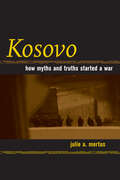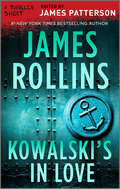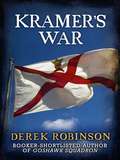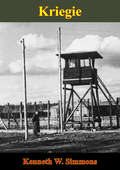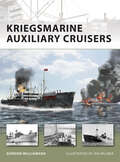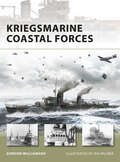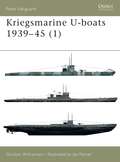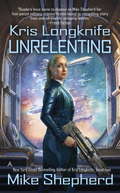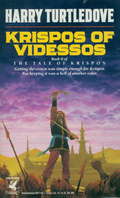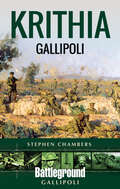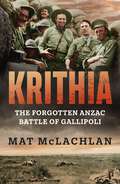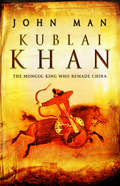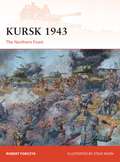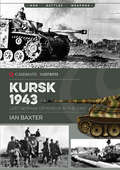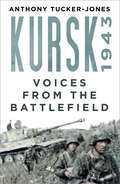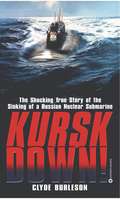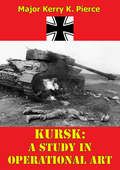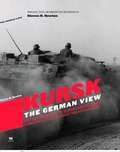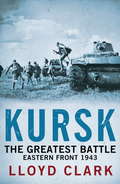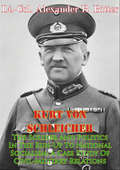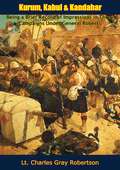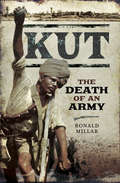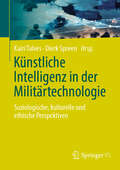- Table View
- List View
Kosovo: How Myths and Truths Started a War
by Julie A. MertusJulie Mertus provides one of the first comprehensive looks at the explosive situation in Kosovo, where years of simmering tensions between Serbs and Albanians erupted in armed conflict in 1998. In a profound and detailed study of national identity and ethnic conflict, Mertus demonstrates how myths and truths can start a war. She shows how our identity as individuals and as members of groups is defined through the telling and remembering of stories. Real or imagined, these stories shape our understanding of ourselves as heroes, martyrs, conquerors, or victims. Once we see ourselves as victims, Mertus claims, we feel morally justified to become perpetrators.Based on a series of interviews conducted in Kosovo, Serbia proper, and Macedonia, this book is one of the first extended treatments of the years leading to war in Kosovo. Mertus examines the formation of Serbian national identity, and closely scrutinizes the hostilities of the region. She shows how myth and experience inform the political ideologies of Kosovo, and explores how these competing beliefs are created and perpetuated. This sobering overview of the region provides a window into a complex struggle whose repercussions reach far into the international community.
Kowalski's in Love (The Thriller Shorts #1)
by James RollinsAn ex-sailor finds himself washed ashore on an island set for destruction in this action-packed suspense story by a #1 New York Times–bestselling author.This Thriller Short is not a love story, at least not in the traditional sense. Fans of James Rollins’s Sigma Force series know Joe Kowalski, a naval seaman with the heart of a hero, but lacking the brainpower to go with it. Kowalski stays in trouble, and here readers will get to know a bit more about his backstory. One that illustrates something Kowalski seems to live by. Dumb luck is better than no luck at all.Originally published in THRILLER: Stories to Keep You Up All Night (2006), edited by #1 New York Times–bestselling author James Patterson.
Kramer's War
by Derek RobinsonJersey, 1944. Lieutenant Earl Kramer, sole survivor of a ditched USAF bomber, crawls out of the sea one night and cuts the throat of a German sentry. Big mistake. Jersey is under Nazi occupation, and the lives of its inhabitants depend on an uneasy co-existence with their oppressors. Though Kramer's motives were entirely patriotic, to the islanders he presents a terrifying risk to their very survival. But to Kramer, a man governed by an overriding sense of duty, this stronghold of Hitler's armies proves too irresistible a target to ignore... Kramer's War is a powerful novel about the savagery of war, from the bestselling and Booker-shortlisted author of Goshawk Squadron.
Kramer's War
by Derek RobinsonJersey, 1944. Lieutenant Earl Kramer, sole survivor of a ditched USAF bomber, crawls out of the sea one night and cuts the throat of a German sentry. Big mistake. Jersey is under Nazi occupation, and the lives of its inhabitants depend on an uneasy co-existence with their oppressors. Though Kramer's motives were entirely patriotic, to the islanders he presents a terrifying risk to their very survival. But to Kramer, a man governed by an overriding sense of duty, this stronghold of Hitler's armies proves too irresistible a target to ignore... Kramer's War is a powerful novel about the savagery of war, from the bestselling and Booker-shortlisted author of Goshawk Squadron.
Kriegie
by 2nd Lieut. Kenneth W. SimmonsKenneth W. Simmons was a bombardier onboard one of the B-24 liberators of 389th Bombardment Group stationed in Europe during the Second World War. As the war ground to a close he had the sheer bad luck to be shot down in October 1944 near Bad Kreuznach and was captured and made prisoner of war. In this book he gives a vivid description of the life of POWs in the American section of Stalag Luft III (in what is now Poland) during the final months of the war, ending with the winter forced-march away from the camp, escaping the advancing Russian troops, and eventually being liberated.
Kriegsmarine Auxiliary Cruisers
by Ian Palmer Gordon WilliamsonDespite the popularity of the U-boats and larger surface vessels like the Bismarck and the Graf Spree, the vast majority of vessels within the Kriegsmarine served in the coastal forces. Though the public may generally have forgotten these smaller ships, many gave crucial service during the war and continued to serve decades after VE day, either in the German Navy or in the navies of the victorious Allies. Indeed, Kriegsmarine minesweepers and their German crews, still in their old uniforms with the swastikas simply removed, continued to serve after 1945 under the control of the Royal Navy, engaged in the dangerous but necessary task of clearing old wartime minefields.The ships and boats included in the coastal forces ranged from such minesweepers to torpedo boats, patrol boats and blockade breakers. These latter were merchant vessels, whose daunting task was to evade the Allied warships to bring essential supplies into Germany. Also included in the coastal forces was Hitler's personal yacht, the Ostwind. This book tells the often-forgotten story of the vessels that formed the backbone of the Kriegsmarine, and combines fascinating anecdotes, detailed technical information, and full-color artwork.
Kriegsmarine Coastal Forces
by Ian Palmer Gordon WilliamsonDespite the popularity of the U-boats and larger surface vessels like the Bismarck and the Graf Spee, the vast majority of vessels within the Kriegsmarine served in the coastal forces. Although less frequently mentioned, these smaller ships gave crucial service during the war and continued to serve decades after VE day, either in the German Navy or in the navies of the victorious Allies. Indeed, Kriegsmarine minesweepers and their German crews, still in their old uniforms with the swastikas simply removed, continued to serve after 1945 under the control of the Royal Navy, engaged in the dangerous but necessary task of clearing old wartime minefields.The ships and boats included in the coastal forces ranged from such minesweepers to torpedo boats, patrol boats and blockade breakers. These latter were merchant vessels, whose daunting task was to evade the Allied warships to bring essential supplies into Germany. Also included in the coastal forces was Hitler's personal yacht, the Ostwind. This book tells the often-forgotten story of the vessels that formed the backbone of the Kriegsmarine, and combines fascinating anecdotes, detailed technical information, and full-color artwork.
Kriegsmarine U-boats 1939-45
by Ian Palmer Gordon WilliamsonThis, the first of two volumes on Germany's World War II U-boats, traces their development from the early U-boats of the Kaiser's Navy, the prohibition on Germany having U-boats following the Armistice in 1918 and the subsequent Treaty of Versailles, the secret development of U-boats using a 'cover-firm' in Holland, culminating in the formation of the 1st U-boat Flotilla in 1935 with the modern Type II. The operational history section includes examples from the Classes Type VIIA, Type VIIB, VIID, VIIE and VIIF before concentrating on the mainstay of the U-boat arm, the Type VIIC. Comparisons are also made with the standard allied submarines, their strengths, weaknesses and U-boat tactics.
Kris Longknife: Unrelenting
by Mike ShepherdIn the New York Times bestselling Kris Longknife novels, “fans of the Honor Harrington escapades will welcome the adventures of another strong female in outer space starring in a thrill-a-page military space opera” (Alternative Worlds).The aliens attacking the planetary system of Alwa are an enemy unlike any Admiral Kris Longknife has ever encountered before. She doesn’t know who they are, only that they worship a being known as the Enlightened One and are unafraid to sacrifice themselves against her fleet.But Kris faces more than just the fanatical behavior of an alien armada. A saboteur has infiltrated the military’s medical facility and unleashed an epidemic that has spread throughout the fleet without warning.Seventy-two career military women are down with something not even the aliens could do to them—including Admiral Kris Longknife…
Krispos of Videssos
by Harry TurtledoveAgainst all expectations, Krispos had won the crown of Videssos. But how long could he hope to keep head and crown together?For trouble was brewing in every, quarter. Civil war erupted under Petronas, the late Emperor's uncle. A brilliant general and a canny politician, Petronas had a very personal score to settle against the upstart Krispos.And even as rebel troops took the field against the untried Emperor, outland raiders swept down from the northlands in a tide of carnage. The power stemmed from foulest sorcery, and Videssos' wizards could not counter its evil curse.Krispos reign showed every sign of being brief -- and very bloody...From the Paperback edition.
Krithia: Gallipoli (Battleground Gallipoli)
by Stephen ChambersKrithia was a key objective in the land offensives; a killing ground greater than Anzac or Suvla. This book adds to the Gallipoli story and the preceding Battleground books on that campaign by recounting not only the landings at Helles of 25 April 1915, but also the subsequent bitter battles that followed in an attempt to capture the village and the vital high ground of Achi Baba. General Hunter-Weston’s weakened 29th Division achieved little during the first two bloody battles of Krithia, even when reinforced by the Anzacs, 42nd Division, Royal Naval Division and the French. The allies had little to show from their costly daylight frontal attacks, apart from a slightly firmer footing ashore and a growing casualty list. As the military situation looked to degenerate into a Western Front style stalemate, General Sir Ian Hamilton pushed for a final battle of Krithia. Using Hunter-Weston’s newly formed VIII Corps, and General Gouraud’s French Corps Expéditionnaire d’Orient, the Third Battle of Krithia launched on 6 June 1915. Despite a promising start, the attack soon collapsed against a stubborn Turkish defence, and although some lessons had been learnt from earlier failures; underestimation of the enemy was not one of them. This is the true story, told using a rich mix of letters, diaries, photographs and maps, of Gallipoli's most costly battles. Gallipoli today is an exquisitely beautiful and tranquil place, with its turquoise waters, stretches of sandy beaches, wild flower covered meadows and pine forested heights, such a contrast to what occurred here over a hundred years ago.
Krithia: The Forgotten Anzac Battle of Gallipoli
by Mat McLachlanThe Second Battle of Krithia has existed largely in the shadows of the bigger Gallipoli story. It is, however, one of the most poignant and tragic tales of World War I. The fascinating story has been brought to light at last by bestselling military historian Mat McLachlan, author of The Cowra Breakout.In May 1915 during World War I, British units tried to capture the village of Krithia on the southern tip of the Gallipoli peninsula. Australian and New Zealand units were sent to reinforce the British. On 8 May, the Anzac troops took part in a bloody battle near Krithia. Advancing across a featureless plain in broad daylight, with no idea where the Turkish defenders were, the Anzacs came under a hail of machine-gun and rifle fire. The Australians managed to advance, but got nowhere near the village and dug in well short of their objective. The New Zealanders on their left fared no better. By the end of the day, over 1800 Anzac troops had been killed or wounded.Supported by first-hand accounts and oral history, Krithia features the stories of a number of Australians, New Zealanders and Turks - some who survived, some who didn't. The battle of Krithia is a tale of bravery and sacrifice, and a vivid portrait of men doing their best under hellish conditions. It's a great Australian story that hasn't been told - until now.
Kublai Khan
by John ManIn Xanadu did Kubla KhanA stately pleasure dome decreeKublai Khan lives on in the popular imagination thanks to these two lines of poetry by Coleridge. But the true story behind this legend is even more fantastic than the poem would have us believe. He inherited the second largest land empire in history from his grandfather, Genghis Khan. He promptly set about extending this into the biggest empire the world has ever seen, extending his rule from China to Iraq, from Siberia to Afghanistan. His personal domain covered sixty-percent of all Asia, and one-fifth of the world's land area. The West first learnt of this great Khan through the reports of Marco Polo. Kublai had not been born to rule, but had clawed his way to leadership, achieving power only in his 40s. He had inherited Genghis Khan's great dream of world domination. But unlike his grandfather he saw China and not Mongolia as the key to controlling power and turned Genghis' unwieldy empire into a federation. Using China's great wealth, coupled with his shrewd and subtle government, he created an empire that was the greatest since the fall of Rome, and shaped the modern world as we know it today. He gave China its modern-day borders and his legacy is that country's resurgence, and the superpower China of tomorrow.
Kursk 1943
by Robert Forczyk Steve NoonKursk 1943 focuses on the northern front and the battle of Kursk, and period of July 5th to August 18th, 1943, covering both the German offensive and the Soviet counteroffensive - Model's AOK 9 pitted against General Konstantin Rokossovsky's Central Front.After recovering from the Stalingrad debacle, Hitler intended to conduct a limited objective offensive (using the new Panther and Tiger tanks) in the summer of 1943 in order to eliminate the Soviet Kursk salient. He intended to conduct a classic pincer attack of the kind that succeeded during the 1942 Kharkov campaign and hoped that the resulting heavy loss of troops and material inflicted on the Red Army would give the Wehrmacht time to recover its strength. Hitler chose two of his best field commanders - Generalfeldmarschall Erich von Manstein and Generaloberst Walter Model - to lead the two pincers against the Kursk salient in Operation Zitadelle. Manstein would attack from the south with Heeresgruppe Süd, while Model attacked from the north with his heavily reinforced AOK 9.Model was not in favor of the offensive because he believed the Soviet defenses were too dense, but he dutifully mounted a full-scale offensive from 5 to 10 July 1943. Model's forces included two battalions of the new Ferdinand tank destroyers and a battalion of Tiger tanks, but were only capable of chewing its way through the first line of Soviet defenses. Although Model had failed to accomplish a breakthrough, his forces were far from spent. When the Soviets mounted their own Operation Kutusov to collapse the German-held Orel salient, Model had sufficient forces left to conduct a fighting retreat back to the Hagen Line. By 18 August 18th 1943, the Soviets had liberated Orel and pushed Model's forces back, but suffered over 400,000 casualties and the loss of 2,500 tanks. The Germans had succeeded in gaining a tactical victory that mauled three Soviet tank armies, although the Red Army had achieved an operational-level victory by liberating Orel.
Kursk 1943: Last German Offensive in the East (Casemate Illustrated #Cis0014)
by Ian BaxterAn illustrated history of World War II&’s largest tank battle that went down near the Russian city. In the summer of 1943, Nazi Germany launched Operation Zitadelle (Citadel), aimed at cutting off Soviet forces in the Kursk salient. This offensive resulted in the Battle of Kursk. Kursk quickly became a fierce contest of attrition, as Wehrmacht and elite Waffen-SS Panzer-Divisions with their powerful Tiger and Panther tanks unsuccessfully tried to hammer their way through the intricate lines of strong Soviet defensive positions. What followed was unabated fighting for two weeks as German units were slowly and systematically ground down in a series of brutal armored battles. During this ferocious fighting the Red Army savagely contested every foot of ground, finally ending German invincibility forever. For the first time in its short history, the blitzkrieg concept had failed. The reverberations caused by the defeat at Kursk were immense, and never again did the German war machine go on the offensive in the East. Stiff defensive action was now the stratagem placed upon the dwindling Panzerwaffe right to the gates of Berlin. With comprehensive captions and text, Kursk 1943 tells the story of this dramatic battle using rare and unpublished photographs, maps, and highly detailed artist profiles. The book reveals the events leading up to the battle in the first half of 1943 and the buildup of forces by both sides before their climatic showdown at Kursk.
Kursk 1943: Voices from the Battlefield
by Anthony Tucker-JonesIn 1943, as war raged along the Eastern Front, the German forces attempted to push further east in the brutal Operation Citadel, which saw one of the largest armoured clashes in history in the Battle of Prokhorovka. Countered by two Soviet attacks, this operation saw the tide turn on the Eastern Front. For the first time a German offensive was halted in its tracks and the Soviets ended the conflict as the decisive victors. With a loss of over 200,000 men on both sides, this two-month offensive was one of the costliest of the war. In this dramatic new study, Anthony Tucker-Jones reassesses this decisive tank battle through the eyes of those who fought, using recently translated first-person accounts. This is one volume that no military history enthusiast should be without.
Kursk Down!: The Shocking True Story of the Sinking of a Russian Nuclear Submarine
by Clyde BurlesonBlack, sleek, and state of the art, the nuclear submarine Kursk was the pride of the Russian fleet. But on August 12, 2000, while on maneuvers in the Barents Sea, the Kursk, hailed as "unsinkable," was blown apart by mysterious explosions. She went down hard with a crew of 118 men trapped inside. For government and military brass far from the scene, the art of spin became more important than the need to save lives. For those on board, the hunger to live summoned astonishing reserves of discipline and heroism. For the rescuers poised at the surface, the devotion to their mission proved more powerful than the savagery of the elements and time itself.
Kursk: A Study In Operational Art
by Major Kerry K. PierceThis monograph examines the practice of operational art from the perspective of the Kursk Campaign of July-Oct., 1943. The study begins by presenting the German and Russian campaign plans as examples of two different methods of achieving a desired end state. Each plan's vision of the future was heavily influenced by the nature of the strategic situation and the personalities of the two principal artists: Adolf Hitler and Marshal Georgii Zhukov. These two leaders had vastly different understandings of strategic possibilities, time-space dimensions of the battlefield, and the means required to achieve their desired end states. The success of Zhukov's campaign plan was directly related to his linkage of appropriate means and methods toward a desired end state, while Hitler's failure represented a failure to do likewise. The monograph also uses Kursk to examine several theoretical concepts of war. These include the relative strength of offense and defense, culminating points, the art of combinations, use of reserves, and the center of gravity.The Russian decision to defend first against an expected German offensive is an excellent example of the use of operational art. Acting on the information of the LUCY espionage network, Zhukov constructed his campaign around an unprecedented tactical defensive system in an effort to destroy the German armored formations as they attacked toward Kursk. He intended to initiate his counteroffensive at the point where the German panzer corps had been so attrited that they would not be able to prevent a Russian onslaught which would expel all German forces from the Donetz Basin. German operational flexibility, which had been the hallmark of their previous campaigns, was eliminated by Hitler's centrally devised and executed plan, reducing commanders such as Manstein and Model to mere tactical actors. In the end the Russian victory was a complete one: tactical, operational and strategic.
Kursk: The German View
by Steven H. NewtonFirsthand accounts of the German commanders who planned and executed the largest tank battle in history
Kursk: The Greatest Battle *special Sales*
by Lloyd Clark5th July 1943: the greatest land battle of all time began around the town of Kursk in Russia. This epic confrontation between German and Soviet forces was one of the most important military engagements in history and epitomised 'total war'.It was also one of the most bloody, characterised by hideous excess and outrageous atrocities. The battle concluded with Germany having incurred nearly three million dead and the Soviet Union a staggering ten million. It was a monumental and decisive encounter of breathtaking intensity which became a turning point, not only on the Eastern Front, but in the Second World War as a whole. Using the very latest available archival material including the testimonies of veterans and providing strategic perspective alongside personal stories of front line fighting, Lloyd Clark has written a lucid, enthralling and heart-stopping account of this incredible battle.
Kursk: The Greatest Battle *special Sales*
by Lloyd Clark5th July 1943: the greatest land battle of all time began around the town of Kursk in Russia. This epic confrontation between German and Soviet forces was one of the most important military engagements in history and epitomised 'total war'.It was also one of the most bloody, characterised by hideous excess and outrageous atrocities. The battle concluded with Germany having incurred nearly three million dead and the Soviet Union a staggering ten million. It was a monumental and decisive encounter of breathtaking intensity which became a turning point, not only on the Eastern Front, but in the Second World War as a whole. Using the very latest available archival material including the testimonies of veterans and providing strategic perspective alongside personal stories of front line fighting, Lloyd Clark has written a lucid, enthralling and heart-stopping account of this incredible battle.
Kurt Von Schleicher—The Soldier And Politics In The Run-Up To National Socialism: A Case Study Of Civil-Military Relations
by Lt.-Col. Alexander B. BitterThis monograph assesses the adequacy of current United States joint campaign planning doctrine within the context of conventional operations between similar forces within a theater of war. The study focuses on five key doctrinal planning concepts-- center of gravity, decisive points, operational reach, balance, and branches and sequels.Joint planning doctrine directly influences the national security of the United States. The foundation of effective and rigorous military planning is the body of professional doctrine that shapes and animates the planning process. The use of poor or insufficient planning doctrine may result in flawed campaign plans which unnecessarily risk the resources and prestige of the United States as well as the lives of America's servicemen and women. Successful campaigns, developed from intellectually sound and militarily thorough planning doctrine, are the building blocks of national victory in war.A case study of Japanese campaign planning efforts at the beginning of 1942 and the retroactive application of selected joint doctrine planning concepts to these efforts is the method and medium of inquiry. Japanese operational planning in 1942 contained a number of complex and difficult challenges. These challenges present a rigorous test for current doctrine. Historically, this process resulted in the disastrous attempt to invade Midway Island. Joint doctrine is assessed as adequate if its application to 1942 Japanese planning would have resulted in the development of a campaign plan potentially more successful than the historical Midway operation.This paper concludes that the rigorous application of current joint doctrine by the Japanese to the planning for the 1942 campaign would have resulted in the production of a more thorough, resilient, and potentially more successful plan. Joint campaign planning doctrine, a way to think about warfare, would have overcome the challenges involved in planning this campaign.
Kurum, Kabul & Kandahar: Being a Brief Record of Impressions in Three Campaigns Under General Roberts
by Lt. Charles Gray RobertsonOriginally published shortly after the end of the Second Anglo-Afghan War in 1881, this book by a British veteran, Lt. Charles Gray Robertson, provides the reader with a first-hand account at the colonialism during nineteenth century India and Afghanistan.
Kut: The Death of an Army
by Ronald MillarKut: The Death of an Army is the fascinating, yet largely forgotten, story of the British-Indian Army, which was besieged in Mesopotamia from 1915 to 1916. It is an expert account of the tragic five-month Turkish siege, in which their enemies essentially outlasted them.The author reveals the day-to-day preoccupations of not only the Anglo-Indian forces, but their enemies the Turks as well as local civilians caught in the chaos. Throughout the campaign, the British were beaten back by the Turks, and the ever-prevailent human suffering of the men, so far away from home in this foreign ground, less than helped the cause: starvation, heavy shelling, inadequate medical supplies and disease were all taking their toll. By the end of the campaign, approximately 30,000 British and Indian soldiers had lost their lives.This informative book will be of interest to anyone wanting a concise and accessible introduction to the conflict and will be essential reading for both students of the First World War, as well as those who have a penchant for military history in general.
Künstliche Intelligenz in der Militärtechnologie: Soziologische, kulturelle und ethische Perspektiven
by Dierk Spreen Kairi TalvesIn diesem Buch werden die Herausforderungen im Bereich der aktuellen und zukünftigen Militärtechnologie kritisch und fachübergreifend beleuchtet. Der Band trägt zur Versachlichung der Debatte über den Einsatz von Künstlicher Intelligenz in militärischen Kontexten bei und bietet einen differenzierten, informierten und offenen Zugang zur Thematik. Der Band gliedert sich in drei Teile. Im ersten Teil werden Perspektiven auf KI erörtert; wie KI-Systeme von der Öffentlichkeit, von Soldaten und in kulturellen Diskursen verstanden und konstruiert werden. Der Schwerpunkt liegt dabei auf militärischen Anwendungen. Der zweite Teil befasst sich mit den Herausforderungen und Veränderungen, die der Einsatz von KI im Militär mit sich bringt, und geht der Frage nach, wie damit umzugehen ist. Der dritte Teil untersucht die kommunikativen Herausforderungen, die sich aus dem Einsatz von KI im Militär ergeben, sowie die damit verbundenen Chancen und Risiken. Das hochaktuelle und zeitgemäße Buch richtet sich an Forscher und Studenten aller Fachrichtungen, die sich für Militärtechnologie interessieren, sowie an alle, die sich für KI und neue Technologien interessieren.
